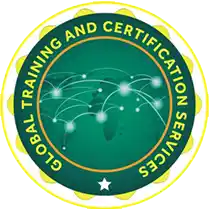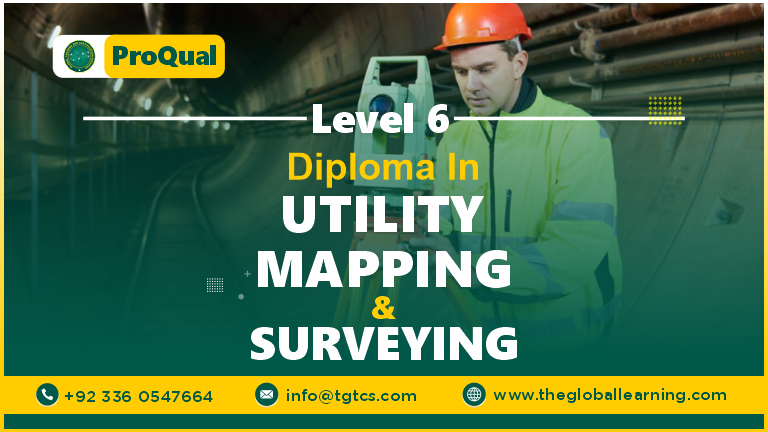ProQual Level 6 Diploma in Utility Mapping and Surveying
ProQual Awarding Body
Average Completion Time:
6-18 Months
Course Level: Level 6
Study Method: Online
Study Units:5 Units
Assessment Based
The ProQual Level 6 Diploma in Utility Mapping and Surveying is an advanced qualification designed for professionals in the surveying and mapping industry. This diploma provides the skills, knowledge, and practical experience required to excel in utility mapping and surveying, a critical field that supports the planning, construction, and maintenance of infrastructure. Whether you’re looking to enhance your career or break into the rapidly growing utilities sector, this qualification offers the ideal pathway.
The ProQual Level 6 Diploma in Utility Mapping and Surveying is a comprehensive qualification that equips professionals with the technical expertise needed to survey and map underground utilities and infrastructure. This course covers the identification, location, and mapping of utilities like water, gas, electricity, telecommunications, and drainage systems, using advanced surveying techniques and technologies.
Graduates of this diploma are prepared for senior roles in the utility and surveying sectors, where they can contribute to the safe and efficient management of underground infrastructure—an essential aspect of modern urban planning and development.
The utility mapping and surveying industry is expanding due to increased demand for accurate underground infrastructure data. Professionals with advanced qualifications like the ProQual Level 6 Diploma are highly sought after by employers in construction, engineering, utilities, and environmental sectors.
The ProQual Level 6 Diploma in Utility Mapping and Surveying offers a unique opportunity to advance your career in a growing and vital industry. By gaining expertise in utility surveying, mapping, and data interpretation, you’ll be equipped with the skills needed to succeed in high-demand roles within construction, engineering, utilities, and more. Whether you’re looking to specialize or move into a managerial position, this qualification opens doors to a wealth of exciting career opportunities.
Entry Requirements
The ProQual Level 6 Diploma in Utility Mapping and Surveying is designed for individuals who have a strong foundation in surveying or a related field and wish to specialize in utility mapping. While specific entry requirements may vary slightly depending on the training provider, the typical entry requirements are as follows:
1. Educational Background:
Minimum of a Level 3 qualification in a related field such as Land Surveying, Civil Engineering, Construction Management, or Geographical Information Systems (GIS).
Alternatively, candidates with a higher education degree in a relevant discipline (such as engineering, surveying, or geospatial sciences) may also be eligible to apply.
2. Relevant Work Experience:
Practical experience in surveying or working within the construction or utility sectors is highly beneficial. This includes experience in areas such as land surveying, civil engineering projects, or utility network management.
Candidates without formal qualifications but with several years of relevant industry experience may also be considered for entry into the course, subject to a review of their background and work experience.
3. Basic Technical Skills:
A basic understanding of surveying and mapping tools (e.g., GPS, total stations, theodolites, laser scanning).
Familiarity with data analysis, mapping, and reporting systems (e.g., GIS software such as ArcGIS or QGIS) is advantageous but not mandatory. Some training providers may offer introductory modules to help build these skills.
4. Communication Skills:
Good communication skills, both written and verbal, are essential as the course involves preparing detailed reports, documentation, and presenting findings.
Applicants should be able to demonstrate proficiency in technical report writing and the ability to work with diverse teams, including engineers, project managers, and clients.
5. Mathematical Competence:
A basic level of mathematics is required, especially in understanding measurement systems, calculations related to surveying, and data interpretation.
6. Health and Safety Awareness:
While not always required as a formal prerequisite, a basic understanding of health and safety practices related to surveying and working on construction sites or utility networks is highly recommended. Many providers will introduce these aspects during the course, especially in practical modules.
Qualification structure
ProQual Level 6 Diploma in Utility Mapping and Surveying
Mandatory Units
| Unit Title | Unit Level |
| Agree project requirements and plan site surveying in geomatics and site surveying management | 6 |
| Manage the analyses and presentation of site surveying information in geomatics and site surveying management | 5 |
| Identify, assess and present spatial data in geomatics and site surveying management | 6 |
| Vacuum excavations | 4 |
| Identify hazards and control risks in geomatics and site surveying management | 5 |
Who is this Course For
Surveying Professionals:
Ideal for land surveyors or those with surveying experience looking to specialize in utility mapping and surveying.
Suitable for individuals working in construction, civil engineering, or geospatial fields who want to advance their careers by gaining expertise in underground infrastructure mapping.
Engineers and Technicians:
Perfect for civil engineers, mechanical engineers, and construction technicians involved in infrastructure projects, who need to understand utility mapping for better project planning, execution, and maintenance.
GIS Specialists:
Beneficial for professionals working with Geographic Information Systems (GIS), who want to incorporate utility mapping data into geospatial analysis and infrastructure management.
Utility Network Professionals:
A great fit for those working in utility companies (water, gas, electricity, telecommunications), especially if you’re involved in mapping, maintaining, or upgrading utility networks.
Project Managers:
Suitable for project managers overseeing utility-related construction or infrastructure projects, who need to understand utility mapping to coordinate safe and efficient work.
Career Changers:
Individuals with a strong interest in surveying, engineering, or infrastructure development, seeking to enter the growing field of utility mapping and surveying.
Future Progression
Specialization in Advanced Surveying Techniques:
Progress to more specialized qualifications in advanced surveying, such as Land and Engineering Surveying or 3D Laser Scanning to enhance expertise in complex projects and cutting-edge technologies.
Leadership Roles in Surveying:
Move into senior positions such as Surveying Manager, Senior Utility Surveyor, or Utility Mapping Team Lead, where you’ll oversee teams of surveyors and coordinate large infrastructure projects.
Project Management:
Transition into Project Management roles, such as Project Manager for utility or construction projects, overseeing all aspects of planning, execution, and delivery of utility mapping initiatives.
GIS and Data Analysis Careers:
Leverage knowledge of Geographic Information Systems (GIS) to pursue careers as a GIS Specialist or Geospatial Data Analyst, integrating utility data into larger infrastructure and urban planning projects.
Consultancy and Advisory Roles:
Become a Utility Mapping Consultant, providing expert advice to utilities, construction firms, or government agencies on mapping and maintaining underground infrastructure.
Entrepreneurship:
Start your own utility mapping firm or consultancy, providing utility surveying and mapping services to private clients, government bodies, or large-scale infrastructure projects.
Further Academic Qualifications:
Pursue Level 7 qualifications in Project Management, Surveying, or Geospatial Science for even higher managerial or technical roles within the surveying and utility sectors.
The Qualification Process
The qualification process for theProQual Level 6 Diploma in Utility Mapping and Surveying involves several key steps designed to ensure that candidates gain the necessary skills and knowledge to succeed in health and safety roles. Here’s an overview of the process:
Continuing Professional Development (CPD): After obtaining the qualification, individuals are encouraged to engage in ongoing professional development to stay updated with changes in legislation and best practices in health and safety.
Eligibility Check: Before enrollment, candidates should ensure they meet the entry requirements, including age, relevant experience, and a basic understanding of health and safety principles.
Enrollment: Candidates can enroll through an accredited training provider. During this stage, they may need to complete an application form and provide evidence of their qualifications and experience.
Initial Assessment: Many training providers conduct an initial assessment to gauge the candidate’s existing knowledge and skills. This helps tailor the learning experience to better suit individual needs.
Learning and Development: Participants engage in the course, which typically includes a mix of theoretical learning and practical assessments. Candidates will study various topics, such as health and safety legislation, risk assessment, and safety management systems.
Workplace Evidence Collection: A significant aspect of the NVQ qualification involves gathering evidence from the workplace. Candidates are required to demonstrate their competence by completing tasks related to their job roles, such as conducting risk assessments or implementing safety procedures.
Assessment: Throughout the course, candidates will undergo various assessments to evaluate their understanding and application of the material. This may include practical assessments, written assignments, and project work.
Portfolio Submission: Candidates compile a portfolio of evidence that showcases their learning and practical application of health and safety practices. This portfolio is submitted for review as part of the assessment process.
Final Evaluation: Once the portfolio and assessments are complete, a qualified assessor reviews the submitted work. They evaluate whether the candidate meets the required standards for the qualification.
Certification: Upon successful completion of all assessments and submission of the portfolio, candidates are awarded the ProQual Level 6 Diploma in Utility Mapping and Surveying. This certification is recognized nationally and signifies a competent understanding of health and safety principles.
Register Now
To Register in ProQual Level 6 Diploma Course Please fill the Registration form or contact us on WhatsApp
Have Queries? Find Solutions Here
The Global Training and Certification Service (TGTCS) Is Associate Training partner of Inspire College of Technologies (ICTQual UK) . TGTCS is offering all ProQual qualifications in association with ICTQual.

